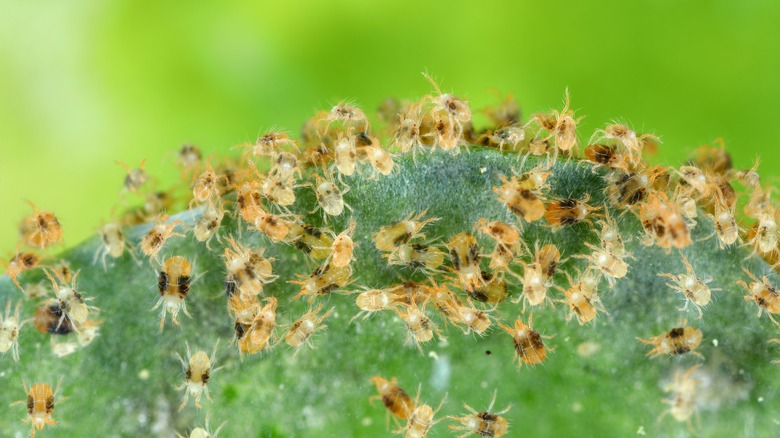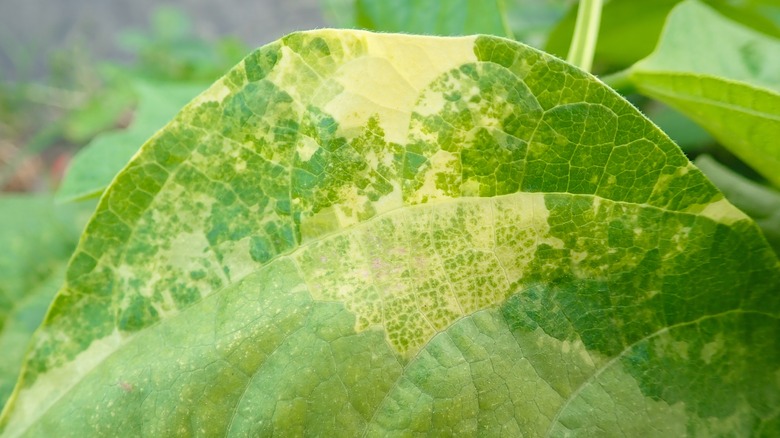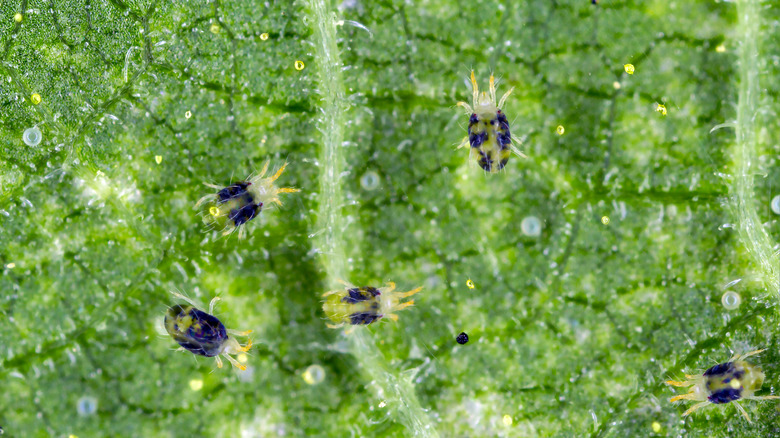Can You Get Rid Of Spider Mites On Houseplants With Just Water? Our Entomology Expert Weighs In
Spider mites pose a risk to the health of your houseplants, so it's important to know how to repel them. If you have a plant that has already been infested with spider mites, it is still possible to save it. You have probably heard all sorts of claims about which substances should be used to repel spider mites, from alcohol, to dish soap, to plain old water — all of the recommendations can get confusing. You might wonder whether water can even get rid of spider mites at all. According to Emma Grace Crumbley, who is an entomologist at Mosquito Squad, you can spray plants with water and wipe them down to keep spider mites at bay. "Plants consistently sprayed down with water are less conducive to mite activity (both for indoor and outdoor plants)," Crumbley explained while speaking exclusively to House Digest.
Before diving further into how to repel spider mites, let's explore the behavior and classification of these pests. "Spider mites (family Tetranychidae) are very small arachnids in the class Acari, the same as ticks," Crumbley revealed. "Spider mites measure about 0.4mm in adulthood, and their bodies consist of a one-part body that lacks wings or antennae. Depending on the species and seasonality, the color can range from red to brown to nearly see-through to spotted." Spider mites are herbivores, so it is no surprise that they are drawn to house plants. In fact, these tiny arachnids use their specialized mouthparts to feed on plant cell fluids, according to Crumbley.
How spider mites damage plants
Spider mites threaten the health of not only houseplants, but also outdoor plants and crops. They feed on plants in groups rather than alone, which makes their feeding sessions even more damaging. "This damage can manifest as aesthetic damage, where plants develop yellow spots covered in silk from mite bites and webbing, or fatal damage for the plant if left unaddressed," Crumbley explained while speaking exclusively to House Digest. Although this damage poses a greater risk to plants in agricultural settings, spider mites still target houseplants as well.
If one of your houseplants falls victim to spider plant damage, you do not have to worry about the bugs attacking you and your family or guests. "Aside from their plant damage, spider mites are not known to be medically important (there are no diseases, allergies, or infections associated with spider mites). As spider mites are herbivores that feed on plant material, they cannot successfully feed on or reproduce on humans or animals."
While spider mites are not known to significantly harm human health, you probably still want to keep them away from your plants. To prevent these mites, be sure to clean dust and debris off of your houseplants by spraying them with water and wiping them down. Crumbley revealed that it is also important to quarantine new plants away from other plants. "This helps ensure you are not accidentally bringing mites into your home or garden," she shared.
Treating an existing infestation
If those preventative methods do not work, or if you did not know to take these precautions, you may be searching for ways to eliminate an existing infestation of spider mites. Solving this issue will depend on whether you are dealing with indoor or outdoor plants. For outdoor plants, gardeners luckily benefit from the help of spider mite predators, Crumbley explained while speaking exclusively to House Digest. "Mites have many natural predators, including ladybeetles and lacewing larvae," she shared. The key is to create an environment that is inviting to these predators. You can help accomplish this by staying away from pesticides. "Spraying plants with pesticides can repel or kill beneficial insects, and mite populations are resilient and can reinfect a treated plant," Crumbley shared.
As for houseplants, a spray bottle with water is the perfect defense against spider mites, just periodically spray and wipe them down to get rid of these bugs. It is best to ignore the recommendations to use a spray with alcohol or dish soap, as soaps can damage a plant's barrier, and alcohol can dehydrate a plant through its roots, according to Crumbley. "On the side of caution, I recommend trying water sprays first," she shared. The entomologist also explained that if you plan to use neem oil to get rid of spider mites, you should test a small section of your plant first, as the oil can harm some types of plants.


